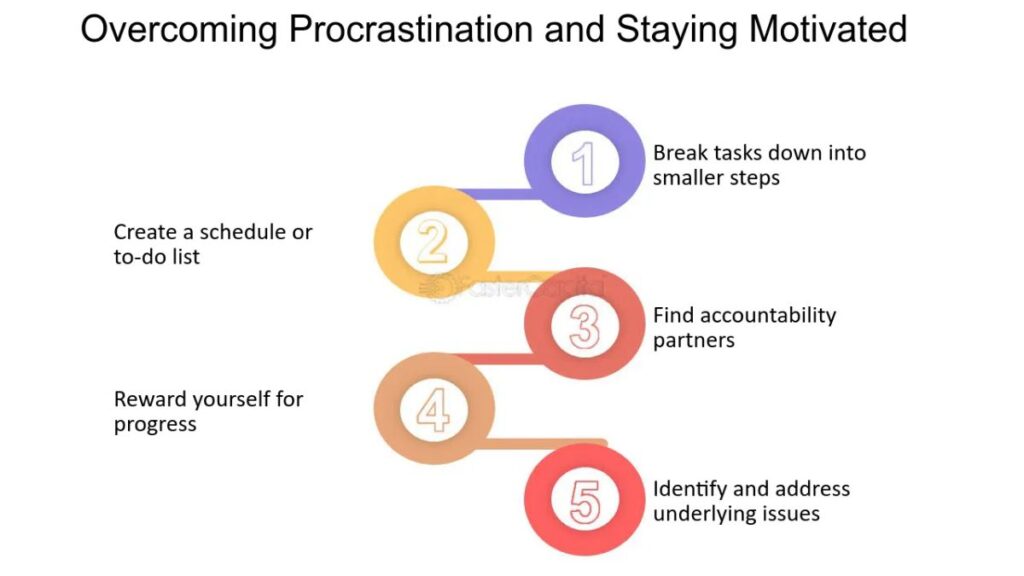Procrastination is a common hurdle that many individuals face, whether in academic pursuits, professional projects, or personal goals. It often leads to a cycle of stress, guilt, and decreased productivity, impacting overall well-being and performance. Understanding the root causes of procrastination is crucial in developing effective strategies for staying motivated and overcoming this counterproductive behavior. In this article, we will explore various techniques and methods to combat procrastination, enabling you to enhance your focus, boost your productivity, and achieve your goals.
Understanding Procrastination
Procrastination is not merely a time management issue; it is often rooted in deeper psychological factors. Fear of failure, perfectionism, and a lack of intrinsic motivation can contribute significantly to this behavior. Individuals may delay tasks because they fear the potential outcome or feel overwhelmed by the scope of the work. Moreover, the allure of immediate gratification often leads us to prioritize short-term pleasures over long-term goals, causing us to push important tasks aside.
Recognizing that procrastination is a complex issue allows us to approach it with empathy and understanding. It’s essential to analyze our habits and identify specific triggers that lead to procrastination. Are there certain tasks that evoke anxiety? Do distractions in our environment contribute to the delay? By examining these factors, we can create a tailored approach to overcome procrastination and cultivate a more productive mindset.
Set Clear and Achievable Goals
One of the most effective strategies for staying motivated is to set clear, achievable goals. Breaking larger tasks into smaller, manageable steps can make the work feel less daunting and more approachable. For instance, if you are working on a significant project, outline specific milestones to track your progress. Each completed task provides a sense of accomplishment and reinforces your motivation to continue.
Using the SMART criteria—Specific, Measurable, Achievable, Relevant, and Time-bound—can help ensure that your goals are well-defined and attainable. This structured approach not only clarifies your objectives but also enables you to celebrate small victories along the way, enhancing your motivation to tackle the next challenge.
Create a Structured Schedule
Establishing a structured schedule is another vital strategy for overcoming procrastination. By allocating specific time slots for tasks, you create a sense of accountability and urgency. Utilize tools such as calendars, planners, or digital applications to organize your daily activities. When you have a clear outline of what needs to be done, it reduces the likelihood of distractions and helps maintain focus.
Consider implementing time management techniques such as the Pomodoro Technique, which involves working in short, focused intervals followed by brief breaks. This method not only enhances concentration but also prevents burnout. By breaking your work into manageable chunks, you make the process less overwhelming and more enjoyable.
Eliminate Distractions
In our increasingly digital world, distractions are everywhere. Whether it’s social media notifications, phone calls, or environmental noise, these interruptions can significantly derail your productivity. Identifying and eliminating distractions is crucial for maintaining focus and motivation.
Create a dedicated workspace that is free from distractions. Inform those around you about your work hours to minimize interruptions. Additionally, consider using apps that block distracting websites during designated work periods. By curating an environment conducive to productivity, you enhance your ability to concentrate and stay motivated.
Find Your Motivation
Intrinsic motivation is a powerful driving force that can help you overcome procrastination. To tap into this motivation, identify your “why”—the underlying reason you want to complete a particular task or achieve a goal. Understanding the significance of your work can reignite your passion and determination.
Additionally, visualize the outcome of your efforts. Imagine the satisfaction of completing a project or the benefits of reaching your goal. This mental imagery can serve as a motivating factor, propelling you forward when you feel tempted to procrastinate. Surround yourself with reminders of your goals, whether through vision boards, affirmations, or motivational quotes, to keep your motivation alive.
Develop a Positive Mindset
A positive mindset plays a crucial role in overcoming procrastination. Negative thoughts and self-doubt can hinder your ability to take action. Instead of fixating on potential failures, focus on what you can achieve. Practice self-compassion by recognizing that everyone experiences setbacks and that they are a natural part of the learning process.
Engaging in mindfulness practices, such as meditation or deep breathing exercises, can help you cultivate a positive outlook. These techniques reduce stress and anxiety, allowing you to approach tasks with a clearer and more focused mindset. Additionally, surrounding yourself with positive influences, whether through supportive friends or inspiring content, can enhance your motivation and resilience.
Establish Accountability
Accountability is a powerful motivator that can significantly reduce procrastination. Share your goals with someone you trust—be it a friend, family member, or colleague. This external accountability creates a sense of obligation, encouraging you to stay committed to your tasks.
Consider joining a study group or professional network where members hold each other accountable for their goals. Regular check-ins and discussions about progress can foster a supportive environment that enhances motivation. Knowing that someone else is invested in your success can provide the necessary push to overcome procrastination.
Reward Yourself
Incorporating a reward system can be an effective strategy for maintaining motivation. Acknowledge your accomplishments, no matter how small, and treat yourself to a reward upon completing tasks. This could be as simple as taking a break, enjoying a favorite snack, or engaging in a leisure activity.
By associating positive outcomes with task completion, you reinforce the habit of productivity and make the work more enjoyable. This positive reinforcement creates a cycle of motivation, encouraging you to tackle future tasks with enthusiasm.
Reflect on Your Progress
Regularly reflecting on your progress is essential for sustaining motivation. Take time to assess what strategies have worked well for you and identify areas for improvement. This self-reflection allows you to celebrate achievements while recognizing patterns that may contribute to procrastination.
Consider keeping a journal to document your journey. Writing about your experiences, challenges, and successes can provide valuable insights and serve as a source of motivation. Reflecting on your growth can also reinforce your commitment to overcoming procrastination and staying focused on your goals.
Seek Professional Help if Needed
If procrastination becomes a chronic issue that significantly impacts your life, seeking professional help may be beneficial. Therapists and counselors can provide valuable strategies and support to address underlying psychological factors contributing to procrastination.
Cognitive-behavioral therapy (CBT) is particularly effective in addressing procrastination. CBT helps individuals identify negative thought patterns and develop healthier behaviors, enabling them to overcome procrastination and improve their overall motivation.
Conclusion
Overcoming procrastination requires a multifaceted approach that addresses the psychological, environmental, and behavioral factors contributing to this challenge. By implementing clear and achievable goals, creating structured schedules, eliminating distractions, and finding intrinsic motivation, you can develop effective strategies for staying motivated.
Cultivating a positive mindset, establishing accountability, and rewarding yourself for progress further enhance your ability to overcome procrastination. Remember, setbacks are a natural part of the journey, and it’s essential to practice self-compassion along the way. With dedication and the right strategies, you can break free from procrastination and unlock your full potential. Embrace the process, stay motivated, and take the necessary steps toward achieving your goals.






